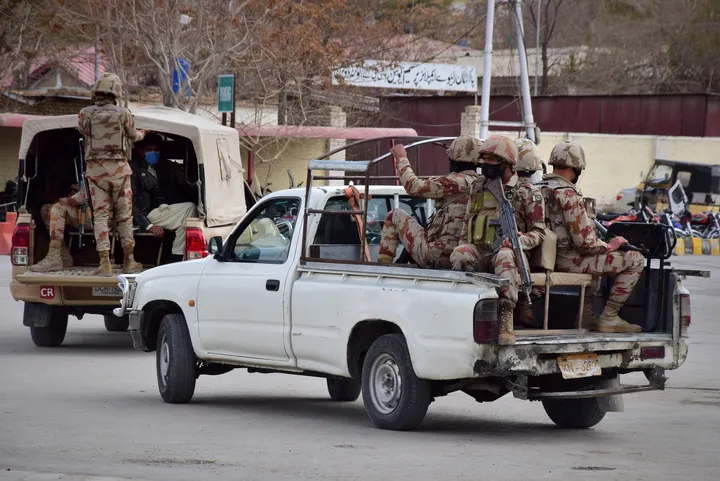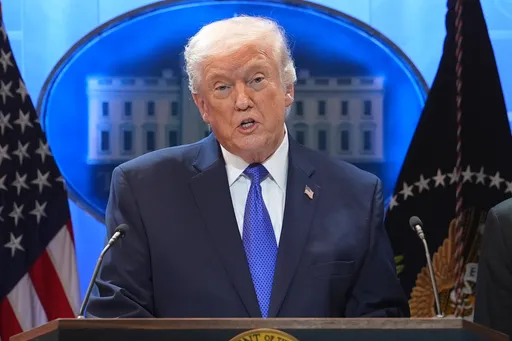The rough and stocky brick and mortar buildings, typical of an Indian small town, do not easily reveal a neat and well spread out campus tucked between multiple backstreets at the centre of Deoband, a nondescript town of north India's Uttar Pradesh state.
Newly painted, the campus is home to the 19th-century Islamic seminary, also known as Darul Uloom – appeared vibrant compared to previous years.
Inside the seminary, thousands of young men in skull caps were sitting on ground and moving back and forth, pouring over the texts. The seminary was founded in 1866, and since then students from Africa to China, Siberia to Turkiye and Afghanistan to Malaysia have assembled in the grand halls with high ceilings to memorise religious texts, often in unison.
Following completion of one or more courses, the students start their own schools in remote hamlets or join prominent Islamic schools as faculty in India or abroad, making Darul Uloom the most influential Islamic seminary in South Asia, said Ashraf Usmani, the media liaison in charge of Darul Uloom. Often referred to as Deoband, its adherents are called Deobandis.
“Now we have about 4,500 students but only Indians are attending classes, owing to education visa restriction. [The] pandemic added to it,” Usmani told TRT World.
Mounting pressure
Early in January, the chief minister of Uttar Pradesh (UP) Yogi Adityanath – considered the new flag bearer of the ultra-right Bharatiya Janata Party (BJP) – inaugurated an Anti-Terrorism Squad (ATS) in Deoband town, where Muslims comprise 70 percent of population. Adityanath sent his “message to terrorists”, insinuating Deoband’s connection with extremist ideologies that groups like Daesh follow.
The installation of an anti-terror unit in close proximity to the seminary came as an unpleasant surprise for many town residents.
“Deoband founders were associated with 1857 mutiny against the British, resisted division of India even opposing Muslim League, issued decrees against all forms of terrorism and remained steadfastly nationalist and yet the ATS was inaugurated close to the seminary,” said Syed Ubaidur Rahman, a Deoband observer who authored several books on the role of Islamic scholars – especially Deobandis – in India’s freedom struggle.
As per local accounts, the ATS will be housing nearly 100 special forces personnel in the neighbourhood.
John Butt, a British national, worked as a journalist and an opera writer for the British Broadcasting Corporation (BBC), produced soaps for a radio station in Afghanistan and recently penned a bestseller “A Talib's Tale: The Life and Times of a Pashtoon Englishman.”
He spent five years (1978-1983) studying the standard eight-year Islamic theology course in Deoband which included – in his words – “Islamic jurisprudence, Arabic grammar, syntax and literature, theology, Quran exegesis and Hadith.” While studying at the seminary, Butt did not experience any attempts being made by teachers to radicalise the students in Deoband.
“The entire focus of Darul Uloom, during my time and to the best of my knowledge ever since, was on attaining academic and spiritual excellence,” he told TRT World via email.
“There was not a hint of any radicalism or insurgent activity. This would have been anathema to the Darul Uloom ethos. I was lucky enough to have been friends in Deoband with two students from Kashmir. Our conversations entirely focused on academic and spiritual matters. There was never even any mention—nor any thought—of any ‘K’ (Kashmir) word”.
The 'K' word means a reference to the Jammu and Kashmir region, a disputed territory divided between India and Pakistan since 1947.
Darul Uloom of Deoband has never been an irritant for India, either politically – as Ubaidur Rahman noted – or economically as American historian Barbara Daly Metcalf indicated in her seminal “Islamic Revival in British India: Deoband, 1860-1900.”
“Financially, the school was wholly dependent on public contributions, mostly in the form of annual pledges, not on fixed holdings of waqf (foundation) or pious endowments contributed by noble patrons,” she noted.
Usmani indicated that the finances are managed the way they used to be 150 years ago, without seeking government grants.
“We cannot take funding from the government, even from Islamic countries or one rich patron. We can only accept small donations from many individuals,” he said.
But with the installation of a military-like facility close to the institution, many lower-income Muslims across India who send their children to the seminary are feeling anxious.
“We heard of so many incidents of attacks on the Muslims in Uttar Pradesh, we are worried,” said Latifa Ahamed, a support staff member in a hospital in Kolkata. Her nephew is a student of Darul Uloom, studying Arabic and religion.
“His father died; we expect him to take care of the family once he returns but now his mother insists on getting him back,” said Ahamed.
In a separate incident in January, the National Commission for Protection of Child Rights (NCPCR), a statutory body, ordered the UP government to “investigate” and “remove” Darul Uloom’s website for issuing decrees “violating” child rights.
The chairperson of NCPCR Priyank Kanongoo told TRT World that the decrees “blatantly violated laws of the land as it advised a mother to practice purdah (womens’ seclusion) from the adult son, if adopted.” The institute is yet to receive any order to dismantle the website, said Ashrafi.
The election
Uttar Pradesh is India’s largest state – population wise – with 403 seats in the local legislative assembly and 15 percent in India’s 543-member national parliament. It represents around 17 percent of the country's electorate and the results of the state's legislative elections are widely believed to foretell the fate of 2024 national elections.
A deep polarisation between majority Hindus and minority Muslims has nearly always benefited the ruling BJP in Uttar Pradesh or UP. The western UP’s population is more than 25 percent Muslim and nearly 40 percent reside in about a dozen districts. Therefore, targeting minorities and subsequent retaliation often consolidate the Hindu vote base. A communal riot in northwestern UP consolidated Hindu votes in the 2017 poll producing more than 75 percent of seats in the state Assembly for the BJP.
Many believe the recent government actions to deploy an ATS or block Darul Uloom’s website are attempts to provoke the minorities, in turn consolidating the Hindu vote base. The NCPCR’s Priyank Kanongoo however denies any connection between issuing notices to investigate Darul Uloom and the UP elections.
How was Deoband tainted?
Deoband was hardly targeted for more than 100 years until the Taliban hijacked an Indian Airlines flight from Kathmandu to Delhi and was forced to land in Afghanistan in December 1999. During an interaction – a government source revealed – the Taliban hijackers expressed their interest in visiting the Deoband seminary. The incident made the Indian government officials suspicious of the activities of Darul Uloom.
Waris Mazhari, a graduate of Deoband who edited the seminary’s “old boys’ magazine” for two decades, argued that it is not necessary to study in Deoband to be a Deobandi.
“It often happens that a person who studied in Deoband many decades back returns to his village to set up a school. The school will be described as one that believes in Deobandi thoughts or Hanafi jurisprudence. Many of the Taliban leaders studied in Pakistan’s Deobandi schools but called themselves Deobandi without ever visiting Deoband,” he said.
But the Taliban hijackers' desire to visit the seminary in UP was taken out of context and weaponised against the institution. Two years after the hijacking, the 9/11 attacks occurred. Afghanistan and the Taliban’s name featured in the list of the countries sheltering radical forces.
“Western press confidently connected Deoband with the Taliban, unabashedly tainting one of the most respected Islamic seminaries. Indian media picked it up further tainting Darul Uloom when the institute had no connection with radical ideologies,” said Mazhari.
However, he is of the opinion that the “archaic courses should be modernised” – an argument opposed by Ashraf Usmani.
“We do modernise and teach English or computers. But how is it possible to change religious studies – Quran or Hadith?” he asked.
The scholars, teachers and students however remained apprehensive and debated if the pressure mounted on the 150-year-old seminary would recede after the elections. Many – including some of the local level functionaries of the BJP – are less alarmed.
“I do not think Deoband has any reason to worry and they know it. The recent commotion is indeed connected to the elections and there is no reason to believe that the uproar would continue after the polls,” said a local BJP official on the condition of anonymity.
The Deobandis of Deoband would like to believe as much.























